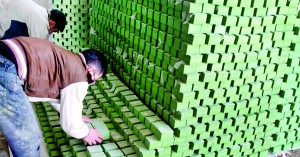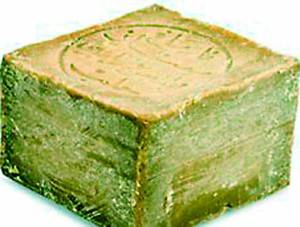Sunday Times 2
Aleppo soap: War threatens an ancient tradition
View(s):Aleppo soap – widely considered to be the first soap ever made – is popular across the Middle East and far beyond. But the intense fighting is making business in Syria’s second city all but impossible – and the soap’s future is uncertain.
One of Nabil Andoura’s earliest memories is making soap with his grandmother.
She was from a family of traditional Aleppo soap-makers and she handed down a closely-guarded recipe that hadn’t changed for generations – “not for centuries” Andoura says proudly.
Made from mixing oil from laurel (bay) trees with olive oil and soda, Aleppo soap uses no chemicals or other additives.

Stacking soap: Andoura's soap contains 82% olive oil and 12% laurel oil
First introduced to Europe by the Crusaders in the 11th Century, demand for the intensely moisturising, all-natural product has soared internationally in the last 10 years.
But last month, after two years of fighting in Syria, Andoura was forced to flee. “It was a difficult decision to leave, very difficult. But it was simply too dangerous to stay,” he says.
“A person like me – I am 56 years old – I’ve lost everything. I lost my hard work. I lost my history.”
Andoura started his own company, Noble Soap, 17 years ago. He grew it into a business worth $10m, exporting to the US, Europe, Japan and China.
Each bar takes almost a year to make. Andoura used to buy the laurel oil directly from villages outside Aleppo, but as demand increased he had to travel further afield – to Latakia on the Mediterranean coast and Antakya in Turkey – to obtain the quantities he needed.
Olive groves, however, were still plentiful in Aleppo, and November and December were spent collecting olive oil from local trees. Production, when the oils were boiled and mixed, usually took place in the winter months.
The mixture was then poured on to a flat surface, like a shallow swimming pool, and then cooled and dried for almost seven months. The resulting block of green, roughly-cut fresh soap was cut and branded with the maker’s stamp.
Andoura introduced only minor alterations to the age-old technique. He heated the soap with a steam-boiler rather than a wood fire, and produced a range of herbal soaps adapted for modern market tastes, using organic camomile, honey and oregano.
In 2010, he produced 500 tonnes of the soap, but then things started to go downhill.
After the summer of 2011, the intense fighting made it too dangerous to travel to his factory on the outskirts of Aleppo, where he employed 75 people.
Then road-blocks and shooting prevented lorries making deliveries to shops in Damascus. Exports also ground to a halt as roads out of the city became unpassable. The blocks of soap built up in his warehouse in Damascus.
Then in 2012, his factory stopped production, and his work rs dispersed. But not only was his business in trouble, Andoura’s safety was also threatened.
One night as he was leaving his office in Damascus, he was ordered out of his car by two masked men. One of the men began to interrogate him, he thinks with a view to kidnapping him, but a car pulled alongside and began shooting at the men. In the confusion that followed, Andoura took his chance and got away. Even after this, he couldn’t bring himself to leave Syria, but then his wife and daughter were almost killed in an explosion in a busy shopping district in Damascus. Though they survived their car was damaged and this settled it for Andoura – he knew he had to get his family out of his country. His son had recently moved to Beirut, and the family joined him there.
Andoura likens the destruction of the city to Japan and Germany after the World War II.
“I believe the Syrian people can re-build, but we need to stop killing each other,” he says.
He is now trying to track down one of his soap-makers, who he’s heard is also in Lebanon, in the hope of starting up his business again.
“I don’t know when or if I can return, so I am doing what I can to try and continue here in Beirut,” he says.
But it won’t be quite the same, he knows, if it’s not made in Aleppo.
Courtesy BBC
Green or Gold?
The soap starts out green and yellows as it gets older |
Follow @timesonlinelk
comments powered by Disqus

